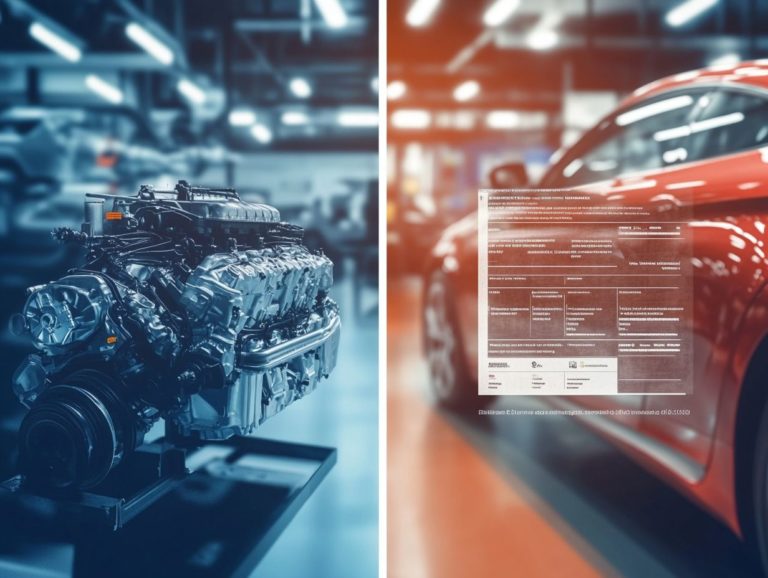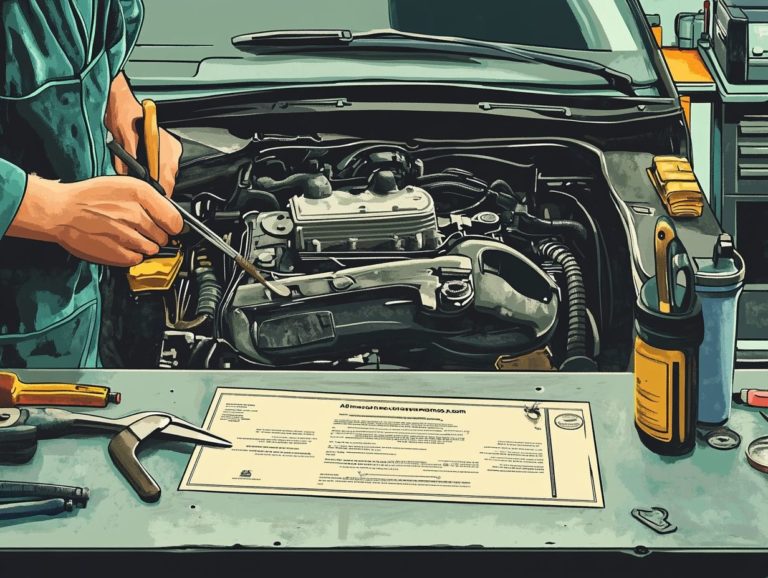How to Ensure Your Warranty Stays Active
Warranties are crucial for protecting your purchases, yet navigating their complexities can be quite challenging. This article will clarify what a warranty is and delve into the various types you may encounter.
You ll discover factors that could potentially void your warranty, common pitfalls to avoid, and essential tips for maintaining its validity. Should you ever find yourself dealing with a voided warranty, you’ll receive guidance on steps to possibly resolve the issue.
Service contracts, which are essentially extended warranties, can provide further options for vehicle maintenance. Dive in now to learn how to safeguard your purchases effectively!
Contents
Key Takeaways:
- Regularly perform proper maintenance and care for your purchase to ensure your warranty stays active.
- Know the terms and conditions of your warranty and follow them carefully to avoid voiding it.
- In the event of a voided warranty, take immediate steps to resolve the issue and consider other forms of protection for your purchase.

Understanding Warranties
Understanding warranties is essential for vehicle owners, offering a vital layer of protection against unexpected breakdowns and expensive repairs. With a range of warranties available such as powertrain warranties and comprehensive coverage grasping the key elements can profoundly influence both the trade-in value of your vehicle and your overall driving experience.
Whether you re behind the wheel of a Toyota, BMW, or Audi, familiarizing yourself with warranty policies gives you the power to stick to the maintenance schedule and follow manufacturer recommendations. This knowledge ensures not only optimal vehicle performance but also longevity, allowing you to enjoy every mile.
What is a Warranty?
A warranty is your assurance that your car will perform as expected while protecting you from specific repair costs, bringing you peace of mind as a vehicle owner.
It acts as a promise from the manufacturer or dealer that any defects in materials or workmanship will be taken care of at no extra charge, usually within a designated timeframe. Beyond shielding you from unexpected expenses, a warranty can also boost your vehicle’s resale value; prospective buyers are frequently drawn to cars that have remaining warranty coverage.
While standard warranties typically cover manufacturer-related issues, mechanical breakdown insurance offers a wider net of protection, including wear and tear. This type of insurance covers repairs that standard warranties may not. For instance, if your engine malfunctions from extensive use, mechanical breakdown insurance will cover you where a standard warranty might fall short.
Service contracts essentially extended warranties can provide further options for vehicle maintenance, closely aligning with both types of warranties to deliver comprehensive coverage for you as a car owner.
Types of Warranties
You have a variety of warranties available for your vehicle, including factory warranties, comprehensive warranties, and powertrain warranties, each tailored to provide different levels of coverage and protection.
Factory warranties, offered by the manufacturer, typically shield your vehicle for a specified duration or mileage, covering a broad range of components. Comprehensive warranties take this a step further, extending protection to include non-mechanical issues like corrosion and electrical system problems.
Meanwhile, powertrain warranties zero in on performance-related parts, specifically the engine and transmission. On the flip side, aftermarket warranties, which you can purchase separately from the dealer, can vary quite a bit in coverage and limitations.
While they might provide additional benefits not included in factory warranties, it s crucial to scrutinize the fine print. After all, these plans often come with deductibles and specific exclusions that could affect your repair costs. Keeping an eye on warranty expiration dates is essential for any vehicle owner.
This vigilance not only determines the types of repairs covered but also significantly impacts the financial consequences of any unexpected breakdowns.
Keep track of your warranty dates and always check the fine print to avoid nasty surprises!
Factors that Can Void a Warranty
A variety of factors can result in your warranty being voided. Warranty fraud, neglecting to adhere to service intervals, and modifications to your vehicle can all jeopardize your warranty coverage.
Stay informed and cautious to ensure that your warranty remains intact.
Common Reasons for Voiding a Warranty

Common reasons for voiding a warranty include:
- Unauthorized repairs
- Modifications to your vehicle
- Inadequate documentation
These actions can lead to substantial repair costs for you as the owner. Straying from established warranty policies can put your coverage at risk. For example, making modifications with parts not made by the original manufacturer or alterations without the manufacturer s approval doesn t just jeopardize your warranty; it can also lead to unexpected complications.
Taking your vehicle to a non-authorized dealer for service may result in inspections or repairs that don t meet warranty standards, leading to potentially costly repercussions.
By keeping meticulous service records and adhering to official guidelines, you can help ensure your warranty remains intact. For further insights, learn how to keep track of your car warranty, providing you with peace of mind should future repairs become necessary.
Tips for Keeping Your Warranty Active
To maintain your warranty, adhere to the manufacturer s maintenance schedule, document your service records, and follow the guidelines in your vehicle s manual.
Doing so will help you avoid costly repairs in the future and ensure your vehicle remains in peak condition.
Proper Maintenance and Care
Proper maintenance and care of your vehicle are essential for keeping your warranty intact. This includes:
- Scheduled service intervals, such as routine oil changes, brake checks, and tire rotations
Your driving habits are equally important. For example, aggressive driving can lead to quicker wear and tear, potentially jeopardizing your warranty claims. Document all essential maintenance tasks such as fluid changes, filter replacements, and inspections in your service records.
Maintaining a detailed log not only meets warranty requirements but also provides valuable history for future buyers, illustrating the care you ve taken with the vehicle. Regularly reviewing these records can help you spot patterns or issues, ensuring your vehicle remains in peak condition.
Understanding Your Warranty
Following the warranty terms and conditions is essential for you as a vehicle owner. It ensures compliance with warranty policies and safeguards your investment over time.
Understanding these warranty terms isn t merely a formality; it directly influences your coverage and potential repair costs. Take time to read the fine print and familiarize yourself with specific conditions that could void your warranty. By keeping all relevant documentation organized and easily accessible like receipts and service records you ll be well-equipped to navigate warranty information and substantiate your claims when needed.
Neglecting the manual or ignoring the prescribed maintenance schedule can lead to serious repercussions, including denial of coverage or unexpected expenses.
What to Do if Your Warranty is Voided
When your warranty is voided, it can feel overwhelming. However, understanding the steps to take empowers you to navigate the situation effectively and potentially reclaim your coverage.
Don t wait! Review your warranty today to ensure you’re protected.
Steps to Take to Resolve the Issue

To resolve a voided warranty, begin by thoroughly reviewing all warranty information and gathering the necessary documentation. Reach out to your dealer for a thorough check of your vehicle.
Reviewing your warranty terms helps you pinpoint any specific terms or conditions that may have led to the warranty being voided. Once you have this information at hand, compile all relevant documents, such as service records and prior communications, that support your case.
Proper documentation is crucial as it serves as proof of your adherence to maintenance schedules and any repairs carried out by authorized personnel. Preparing now helps you for the dealer’s inspection and strengthens your position if any disputes arise.
Being proactive and meticulous at this stage can significantly impact the resolution of your warranty concerns.
Alternatives to Warranties
If a traditional warranty isn’t right for you, look into other options. Mechanical breakdown insurance and vehicle service contracts can protect you from unexpected repair costs, ensuring you stay safeguarded and confident on the road.
Other Forms of Protection for Your Purchase
Explore additional layers of protection for your purchase, such as vehicle service contracts and mechanical breakdown insurance. These options are specifically designed to cover repair costs that standard warranties may overlook.
These alternatives not only enhance traditional warranties but also offer distinct advantages tailored to your unique needs. Vehicle service contracts can provide extensive coverage options that focus on specific components prone to wear and tear.
On the other hand, mechanical breakdown insurance typically activates once a manufacturer’s warranty expires, granting you continued peace of mind. Make sure to check the limitations of each option, including any exclusions or higher deductibles, particularly when compared to more conventional warranties.
These protective measures can seamlessly work together with your existing warranty information, forming a robust safety net for those who wish to protect their investments and minimize unexpected repair costs.
Frequently Asked Questions
Here are some common questions regarding warranties and how to maintain them:
How do I ensure my warranty stays active?
To ensure your warranty stays active, read and understand the terms and conditions of your warranty. This will help you know what actions may void your warranty and what steps you need to take. If you’re unsure about your options, consider checking out what to do when your warranty is about to expire.
What actions could void my warranty?

Actions that could potentially void your warranty include using the product for purposes other than its intended use, modifying the product, or not following the recommended maintenance schedule. It s important to fully understand the warranty terms to avoid unintentionally voiding it.
Do I need to register my warranty?
Some warranties require registration to stay active. Be sure to check the terms of your warranty and follow the best practices for maintaining warranty coverage if necessary. This will ensure that your warranty remains active for the duration of its coverage.
What should I do if I have a warranty claim?
If you need to make a warranty claim, follow the specific instructions outlined in your warranty. This may include contacting the manufacturer, providing proof of purchase, and following the designated process for filing a claim.
Can I transfer my warranty to a new owner?
In most cases, warranties are non-transferable and can only be used by the original purchaser. However, some warranties may allow for transfer to a new owner. Be sure to check the terms of your warranty if you plan to sell or give away the product.
What happens if my warranty expires?
Once your warranty expires, you will no longer have coverage for any issues that may arise with your product. It s important to keep track of your warranty expiration date and consider purchasing extended warranty coverage if it is available.





